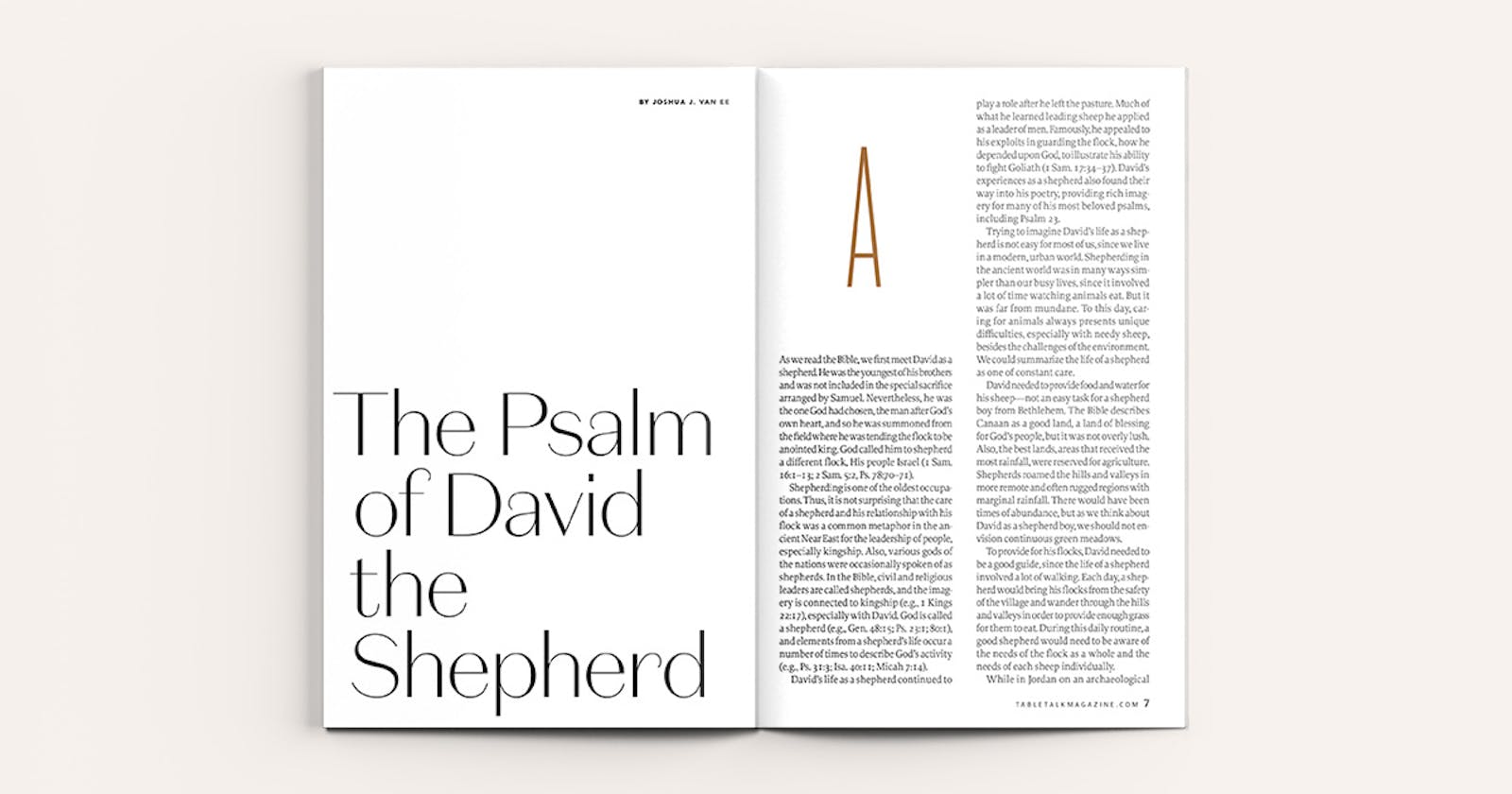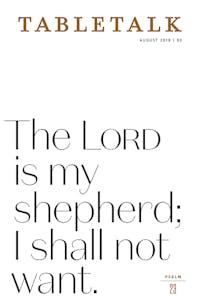
Request your free, three-month trial to Tabletalk magazine. You’ll receive the print issue monthly and gain immediate digital access to decades of archives. This trial is risk-free. No credit card required.
Try Tabletalk NowAlready receive Tabletalk magazine every month?
Verify your email address to gain unlimited access.
As we read the Bible, we first meet David as a shepherd. He was the youngest of his brothers and was not included in the special sacrifice arranged by Samuel. Nevertheless, he was the one God had chosen, the man after God’s own heart, and so he was summoned from the field where he was tending the flock to be anointed king. God called him to shepherd a different flock, His people Israel (1 Sam. 16:1–13; 2 Sam. 5:2, Ps. 78:70–71).
Shepherding is one of the oldest occupations. Thus, it is not surprising that the care of a shepherd and his relationship with his flock was a common metaphor in the ancient Near East for the leadership of people, especially kingship. Also, various gods of the nations were occasionally spoken of as shepherds. In the Bible, civil and religious leaders are called shepherds, and the imagery is connected to kingship (e.g., 1 Kings 22:17), especially with David. God is called a shepherd (e.g., Gen. 48:15; Ps. 23:1; 80:1), and elements from a shepherd’s life occur a number of times to describe God’s activity (e.g., Ps. 31:3; Isa. 40:11; Micah 7:14).
David’s life as a shepherd continued to play a role after he left the pasture. Much of what he learned leading sheep he applied as a leader of men. Famously, he appealed to his exploits in guarding the flock, how he depended upon God, to illustrate his ability to fight Goliath (1 Sam. 17:34–37). David’s experiences as a shepherd also found their way into his poetry, providing rich imagery for many of his most beloved psalms, including Psalm 23.
Trying to imagine David’s life as a shepherd is not easy for most of us, since we live in a modern, urban world. Shepherding in the ancient world was in many ways simpler than our busy lives, since it involved a lot of time watching animals eat. But it was far from mundane. To this day, caring for animals always presents unique difficulties, especially with needy sheep, besides the challenges of the environment. We could summarize the life of a shepherd as one of constant care.
David needed to provide food and water for his sheep—not an easy task for a shepherd boy from Bethlehem. The Bible describes Canaan as a good land, a land of blessing for God’s people, but it was not overly lush. Also, the best lands, areas that received the most rainfall, were reserved for agriculture. Shepherds roamed the hills and valleys in more remote and often rugged regions with marginal rainfall. There would have been times of abundance, but as we think about David as a shepherd boy, we should not envision continuous green meadows.
To provide for his flocks, David needed to be a good guide, since the life of a shepherd involved a lot of walking. Each day, a shepherd would bring his flocks from the safety of the village and wander through the hills and valleys in order to provide enough grass for them to eat. During this daily routine, a good shepherd would need to be aware of the needs of the flock as a whole and the needs of each sheep individually.

While in Jordan on an archaeological survey, I was able to observe Bedouin shepherds and their flocks. Each morning they traveled several miles as they sought out adequate pastures. I was always amazed that they were able to keep their flocks together and on track even though, as in David’s day, there were no fences to contain them. During the day, the sheep and goats would spread out to graze and rest. Then the shepherds would gather their flocks to make the journey back to the village before dark, making sure each one was accounted for.
David also needed to be a guardian of his flock. Bedouin shepherds do not face the same threats from wild animals that David did. There are still wolves and a few leopards in Israel, but the lions and bears that David knew are gone. Sheep and goats are easy prey, and thus shepherds must be vigilant protectors, sometimes endangering their own lives. Even if a shepherd is able to drive off these dangerous predators, the flock will most likely scatter and need to be gathered, often from various nooks and crannies. Dogs were used to help guard the flocks against wild animals and are mentioned a few times in the Bible (Job 30:1; Isa. 56:11) but never as a companion of David.
All of these elements show how close of a bond there was between a shepherd and his sheep. He was their constant companion and would need to know them individually and intimately to properly care for them. The sheep would learn to trust their shepherd, follow his leading, and listen to his voice. David knew the constant care needed to be a good shepherd and thus it provided a rich metaphor for God’s constant care for him in Psalm 23. We know even more fully of the costliness of God’s constant care for us as seen in Jesus, who said: “I am the good shepherd. The good shepherd lays down his life for the sheep” (John 10:11).
